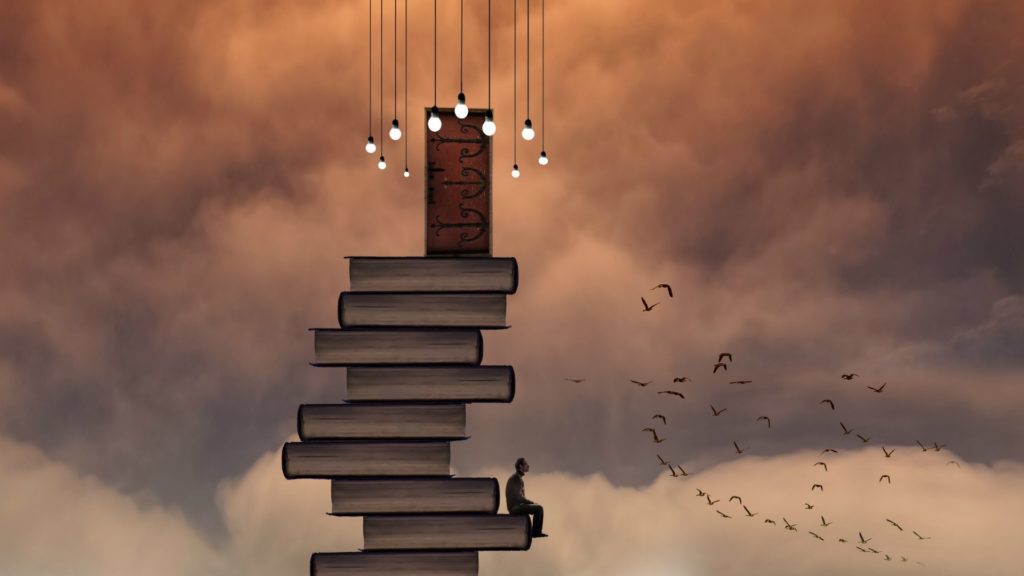It is a truth universally acknowledged that a bored person in possession of sound intellectual faculties must be in want of a book. Many people confess that reading is a wonderful way to spend one’s free time. It is also, in the best of times, and in the worst, a delightful way to entertain yourself. Most of us wholeheartedly admit reading is healthy, it cultivates our imagination, and it teaches us empathy: the ability to enter into someone else’s world and feel for them, care for them, to experience their pain with them.
I came into literature slowly, and then madly. I love to read. As time passes, and my writing life changes, it occurs to me that it’s acceptable and perhaps necessary to talk and write about the magic we find in literature, about the pleasure and art of reading stories, of soaking in myths and fables, memoir and fairy tales.
My reading life really began in fifth grade, on a dark and stormy night, or maybe it was a dark and stormy day. My teacher hauled us to the library. I didn’t know what I should read, so I approached the librarian and asked her for a recommendation. She handed me an old, hardback copy of A Wrinkle in Time, which I started immediately. That was the first day of the rest of my life. I swear. I curled up with that book and disappeared into its pages. I finished it that evening and can still feel the cool of the dishwasher against my back as I leaned against it on my kitchen floor, unable to move, because I was desperate to know what was going to happen next.
It wasn’t as if I’d never read a book before. My mother read the Narnia stories to us when we were little, and I certainly loved some of the stories my teachers read out loud to me, but that day something shifted inside me. I opened the book and transported into a whole new world, a world that delighted me, horrified me, and comforted me. It also absolutely unlocked me. From that day forward, I turned into the girl who loved to read, a girl who discovered friendship, and adventure in thousands of pages, who used stories to stir up her courage, and dared to dream again, and who drew on fictional people to be her guides through the murky waters of her life. You know you have it bad, when you think to yourself, “What would Philippa, do?” and you’re able to answer the question, and respond accordingly.
Truthfully, we do not get to choose the time in which we are born, only what to do with the time we are given. If, how we spend our days is so important, what makes choosing to spend our days reading, a noble choice? What is different with me spending the day absorbed in a book any different from a day absorbed in a television series?
A great deal, as a matter of fact.
When reading a story, we use our mental faculties to picture images and imagine the scenes unfolding. Have you ever watched a movie after you finished the novel and groaned, because you don’t like how Hollywood portrays your favorite character? This is the exact thing that happened to me with Professor Lupin. I imagined a dashing, and yet foreboding professor, who at the light of the full moon turned into a Werewolf. Hollywood didn’t portray him that way at all. He was altogether smarmy in the movie series.
However, turn it around, and you have a whole different experience. If you watch the movie and then read the book, Hollywood sets the stage for you. Hollywood tells you how you are supposed to imagine your beloved characters. You become the follower, instead of the leader. If we do this too often, we lose our ability to conjure up our own pictures, which incidentally, is quite important to our overall health and well-being. Imagination is one of the primary tools we draw upon in order to make important changes, to picture a different sort of life, or even to simply endure great hardship and dare to choose hope.

Reading stories about other people, pretend or make believe, helps us comprehend what it means to live life. When we read something truly epic, something worthwhile, we recognize that we’ve stumbled upon truth cast in mystical shades of light and dark, of hope and death intermingled together into something sacred and tender and it takes our breath away. It sweeps us up and swallows us whole.
When we encounter a person, or people who show us the beauty of authentic faith, we’re changed and challenged, enlightened and silenced, if only for a few moments. But it goes into our memory and it’s there when we need to draw on it.
Over these last several weeks, I’ve immersed myself in the memoirs of Alexandra Fuller. She has reminded me that telling the truth is the beginning of living the truth. We can’t live out truth in any authentic way, if we’re afraid to tell the truth of our own lives, if only to ourselves.
When we read stories, we learn the importance of telling the truth. Just tell the truth about your own life, for goodness’ sake, and all will be begin to make sense. But it’s not so easy. Examining one’s life is not as easy as just telling the truth, or is it? Is an unexamined life worth living? Perhaps. Perhaps, not. Whatever the examined life is, to actually do it, is one of the most daring things we ever accomplish. To stare into our own life story and take a good long look takes a kind of gumption people only get from having lived to tell the tale. And like Old Gus tells us, It sure ain’t dying we’re talking about, it’s living and it takes gumption to really live.
Reading great literature provides us a framework, a map for the sacred journey of truth telling. When we encounter a character in literature, be it Anne Shirley or Frodo, or even Pastor John Ames we hear the sound of truth in their story, we catch its beat, its sacred rhythm and begin to learn its language, with the hope that over time we will learn to match their rhythm, rise with courage, and speak our own truth.
Please see below to share this post.
Also, please sign up for my monthly newsletter.
I send it during the last few days in each month.


I think I was in fifth grade too. My mom would take me to the library every Saturday after choir practice. My library want list is ever growing. Actually two are waiting for me right now. And Madeleine L’Engle mentored me though her literature. She was my mom’s age and so bold and wise for a woman of her generation. So I’m signing up right now Tina xoxo
I love that we both read Madeleine L’Engle when we were the same age! So cool. ‘
Thank for signing up.
xox
Tina Lee,
You and I have an awful lot in common… And I wonder how much of it hardens back to our shared elementary school experience of A Wrinkle in Time!
I really like the way that you summed up the power of imagination:
“Imagination is one of the primary tools we draw upon in order to make important changes, to picture a different sort of life, or even to simply endure great hardship and dare to choose hope.”